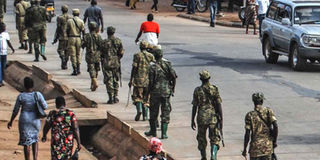Lockdown: Upcountry crime rate declines

Security forces patrol Arua town streets to enforce the lockdown on Wednesday last week. Police have registered the lowest crime rates upcountry during the lockdown period. PHOTO BY FELIX WAROM OKELLO
Police in the countryside have said they are experiencing the lowest crime rates in their history during this period.
However, police explain that some cases go unreported due to restriction of movements.
Lango Sub-region
In Lango Sub-region, police say the crime rate has drastically reduced largely because of the 7pm to 6:30am curfew.
The North Kyoga regional police spokesperson, Mr Michael Odongo, on Tuesday said many criminals have been kept at bay by the increased presence of security personnel enforcing the curfew.
He added that places that used to host criminals such as bars, disco halls and betting parlours have since been closed and as a result, criminals have no place to hide.
He, however, noted that some wrong elements are taking advantage of the curfew to stage illegal roadblocks at night and rob unsuspecting people of their valuables.
The Dokolo District police commander, Mr Alfred Baluku, said the crime rate has reduced due to the lockdown, but that they are getting challenges in implementing the night curfew.
“The President said we shouldn’t move into people’s houses and yet people have turned their houses into bars where they lock themselves,” he said.
Busoga Sub-region
The Busoga North police spokesperson, Mr Michael Kasadha, said crime rates have reduced because people are now at home.
“During the times of the English Premier League, men would be absentee husbands as their wives flocked to the Child and Family Protection Units to report their failure to provide basic needs and not fulfilling their marital duties. They are now at home by 7pm,” Mr Kasadha said.
In Buyende District, Mr Wilson Wagumare, the Kidera Sub-county chairperson, said sanity has come to the families since they are now working together in homes and gardens.
However, local leaders in Njeru Municipality, Buikwe District are batting residents who have turned their homes into bars.
The Ssezibwa regional police spokesperson, Ms Hellen Butoto, said there are few cases of disobedience of lawful orders by residents in Kayunga, Buikwe and Buvuma districts.
However, overall, Ms Butoto said criminal cases have reduced as result of closing of bars, nightclubs and the night curfew that ensures that people are in their homes by 7pm.
Bugisu Sub-region
The Elgon police spokesperson, Mr Rogers Taitika, said crime rates in Bugisu Sub-region have drastically reduced during the lockdown period.
He, however, noted that four murder cases have been registered in different districts that form Elgon Sub-region, which comprises the districts of Bulambuli, Sironko, Mbale, Manafwa, Bududa and Namisindwa.
Bukedi Sub-region
The Bukedi regional police commander, Mr Ceaser Tusingwire, said Bukedi Sub-region is also ‘very quiet’, with petty cases registered across the region, except two cases of break-ins of small shops in Tororo District.
Bukedi Sub-region comprises of Pallisa, Budaka, Butebo, Kibuku, Butaleja, Busia and Tororo districts.
Albertine region
In the Albertine area, the regional police spokesperson, Mr Allan Julius Hakiza, said there is a general decline in crime because of the night curfew and increased presence of police backed up by the army and Local Defence Unit (LDU) personnel.
“Most of the cases we are now receiving are about people masquerading as security operatives to extort money from unsuspecting citizens,” he said.
The acting Kakumiro District police commander, Mr Nelson Tumushiime, said most of the 22 suspects who were at Kakumiro Police Station by the beginning of the week had been arrested for violating the presidential guidelines and defying curfew orders. He said seven of them were on Tuesday released on police bond.
In Ntoroko District, the district police commander, Mr David Katunda, said crime rates have gone down because people are in their homes by 7pm.“We now receive simple assault and domestic violence cases,” Mr Katunda said.
The officer-in-charge of Child and Family Protection Unit at Kabalore Police Station, Ms Agnes Angom, said domestic violence-related cases have reduced, but she attributed this to the failure by the victims to report the cases for lack of transport to the police station.
The Kyenjojo District police commander, Mr Julius Kagazi, said the crime rate has reduced because of the lockdown.
“We used to get between three and four cases daily but that has dropped because many people are at home by 7pm,” he said, adding that cases of cattle thefts have also reduced following the closure of public transport and markets.
Teso Sub-region
In Teso Sub-region, the continued presence of security personnel enforcing the night curfew has controlled late night crimes around Soroti Town, police have said.
Police say unlike the first day of the curfew when cases of attempted burglaries were registered, there is now relative peace in the region.
Mr David Ongom Mudong, the East Kyoga region police spokesperson, said: “The security operatives are in control of the situation.”
Acholi Sub-region
In Acholi Sub-region, there is relative peace following the curfew aimed at curbing the spread of Covid-19.
The chairperson of Pece Division in Gulu Municipality, Mr Kerry Komakech, said street children had retreated to the suburbs where they had started harassing people but they had been stopped.
In Pader District, three people sustained serious injuries in a fight over land on Monday.
“The victims are receiving treatment at Kitgum General Hospital,” Mr Jimmy Patrick Okema, the Aswa region police spokesperson, said.
Compiled by Philip Wafula, Felix Basiime, Alex Tumuhimbise, Alex Ashaba, Denis Edema, Sam Opio Caleb, Mudangha Kolyangha, Fred Wambede, Bill Oketch, Charity Okullo, Patrick Ebong, Isaac Otwii, Simon Peter Emwamu, Cissy Makumbi, Felix Warom, Scovin Iceta, Rashul Adidi, Dan Wandera, Sadat Mbogo, Ambrose Musasizi & Malik F. Jjingo



